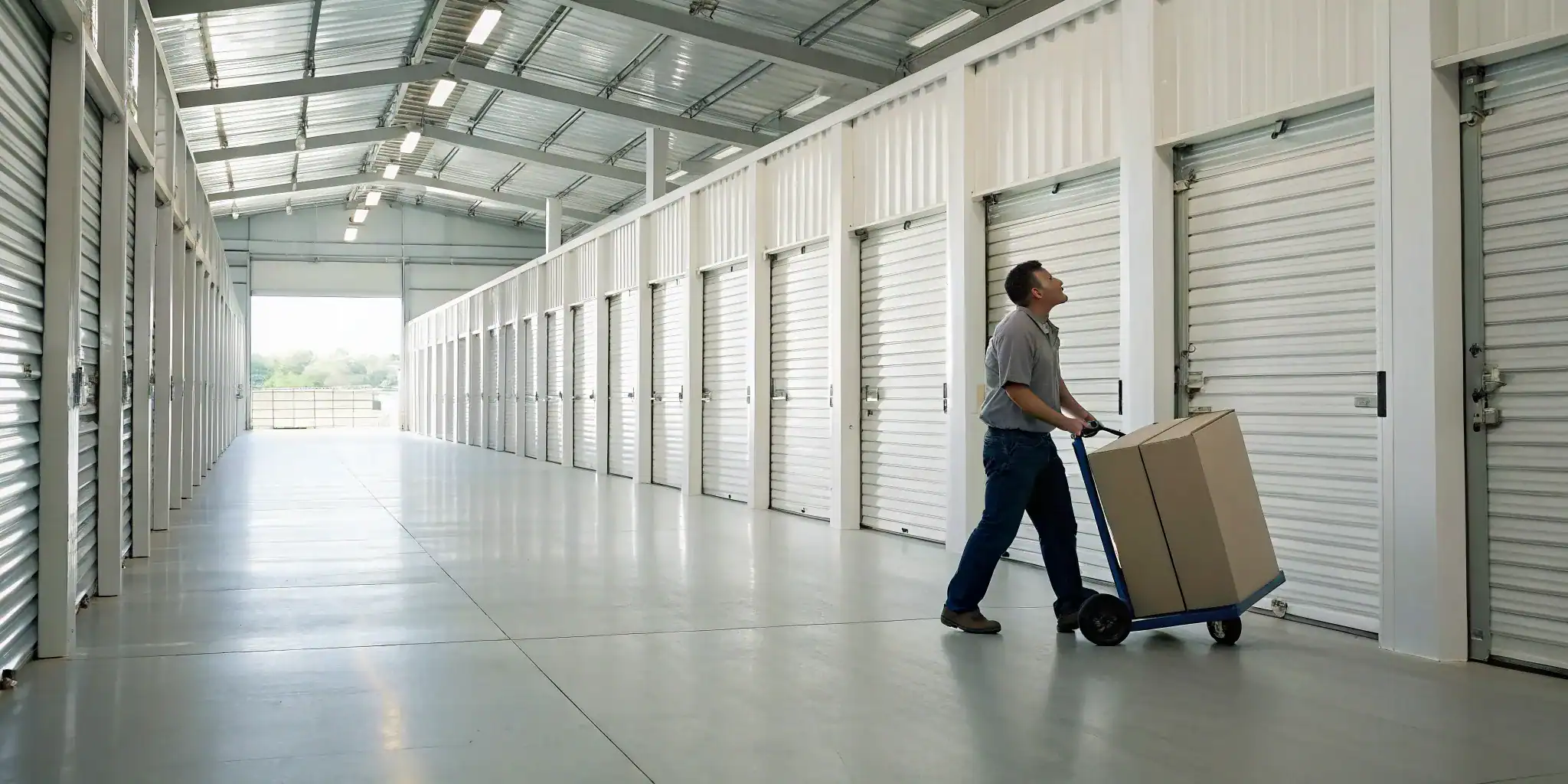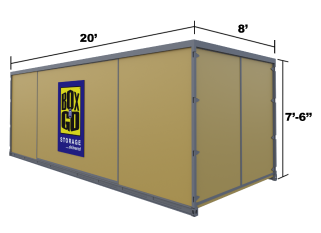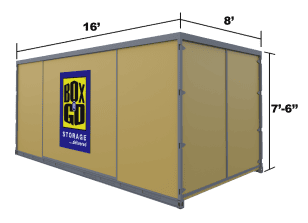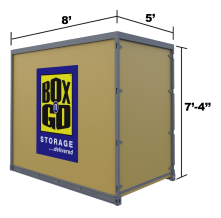Large Business Storage Units: Your Complete Guide

Let’s be honest: the last thing you have time for is renting a truck, loading it up, and hauling everything to a storage facility. Your time is better spent running your business. Traditional storage methods often create more work, forcing you to handle your inventory and equipment multiple times. Modern large business storage units, however, are designed with your efficiency in mind. They provide a secure, off-site space to declutter your primary workspace without the logistical headache. This guide will walk you through finding a solution that saves you time and effort, so you can focus on what truly matters—your company’s success.
- Save 50% on move-in
- No truck rental
- Ground level










- Save 50% on move-in
- No truck rental
- Ground level
Box-n-Go Portable Storage Unit Sizes

Key Takeaways
- Treat Storage as a Financial Tool: A storage unit is a cost-effective alternative to expensive commercial leases. It offers flexible, month-to-month terms that let you scale your space up or down, saving money and freeing up capital for your business.
- Reclaim Your Workspace for Core Operations: An organized storage unit acts as an off-site extension of your business. By moving excess inventory, documents, or equipment into a well-managed space, you declutter your main office or shop, allowing your team to focus on revenue-generating activities.
- Prioritize Convenience to Save Time and Labor: Modern storage solutions, like portable containers, eliminate the need for truck rentals and double handling. Having a unit delivered to you cuts your workload in half, making the entire process of storing and accessing your items far more efficient for a busy business.

What is a Large Business Storage Unit?
When your business starts to feel cramped, a large storage unit can feel like a breath of fresh air. Think of it as an extension of your office, warehouse, or storefront—a secure, off-site space designed specifically for commercial needs. Businesses use them to store everything from excess inventory and seasonal decorations to important documents and heavy equipment. While the term “large” can vary between providers, it generally refers to units spacious enough to handle the contents of a multi-room office, a substantial amount of retail stock, or bulky contractor tools.
Choosing the right storage isn’t just about finding extra room; it’s about finding a solution that makes your operations smoother. A good business storage unit helps you stay organized, manage inventory more effectively, and avoid the high costs of leasing a larger commercial space. Whether you’re a growing e-commerce brand, a construction company with valuable equipment, or a law firm archiving files, there’s a storage solution built to handle the load. It’s a flexible way to manage your physical assets without committing to a long-term, expensive lease on more property.
Store on your driveway or inside our secure facility. Load/unload only once. Ground level access.
Common Sizes and What They Hold
When you see listings for large storage units, you’ll typically find sizes like 10×20 or 10×30 feet. To give you a better picture, a 10×20 unit is about the size of a standard one-car garage. It can comfortably hold the contents of a small office, including desks, chairs, file cabinets, and around 200 standard file boxes. This size is perfect for small retailers needing to store extra inventory or for businesses in transition.
If you need even more space, a 10×30 unit offers a significant amount of room. It’s a great fit for storing larger equipment, extensive inventory for an e-commerce business, or the entire contents of a medium-sized office. Many providers offer a range of business storage options categorized as small, medium, or large to help you find the perfect fit.
Different Types of Storage Solutions
Not all business storage is created equal. The right solution depends entirely on your company’s specific needs. Some providers offer a straightforward, no-frills space, while others provide comprehensive services for businesses of all sizes. For example, you can find storage solutions for businesses that cater to everyone from small local shops to large national companies with complex logistical needs.
This means you can often find more than just a simple storage unit. Some companies offer customized storage plans that are tailored to your inventory, timeline, and access requirements. Whether you need climate control for sensitive documents, 24/7 access for off-hours work, or special accommodations for oversized equipment, there’s likely a provider who can create a plan that works for you.

Portable vs. Traditional: What’s the Difference?
The biggest difference in business storage comes down to how you get your items into the unit. With traditional storage, you’re responsible for packing a truck, driving to a facility, and unloading everything into your unit. It’s a time-consuming process that involves a lot of heavy lifting and double handling.
Portable storage, on the other hand, brings the unit directly to you. A container is delivered to your business, allowing you to load it at your own pace. Once it’s packed, it can be stored on-site for easy access or transported to a secure warehouse. This approach eliminates the need to rent a truck and cuts your loading and unloading work in half, making it a far more efficient option for busy professionals. It’s a modern solution that prioritizes convenience and flexibility.
Why Your Business Needs a Large Storage Unit
As your business grows, you’ll eventually face a common challenge: running out of space. Whether it’s piles of inventory taking over your workspace, stacks of documents cluttering your office, or seasonal equipment with nowhere to go, a lack of space can slow you down. While leasing a larger commercial property seems like the obvious next step, it comes with high costs and long-term commitments. A large business storage unit offers a smarter, more flexible solution. It’s more than just a place to put things; it’s a strategic tool that can help you operate more efficiently, save money, and scale your business on your own terms.
Save Money on Commercial Space
One of the most compelling reasons to use business storage is the cost savings. Expanding your commercial lease or renting a dedicated warehouse can be incredibly expensive, locking you into a long-term contract that might not fit your budget. In contrast, using business storage is often much cheaper than renting more commercial space. This allows you to keep your overhead low while still getting the room you need. Think of it as an affordable extension of your current workspace. You can store excess inventory, archival documents, or equipment without paying premium prices for commercial square footage, freeing up capital to invest back into your business.
- Call or order online in minutes
- We deliver storage to you
- Pack at home, at your convinience
- Store on your property or at indoor facility
- Move locally or nationwide
- Call or order online in minutes
- We deliver 16′ and 20′ storage to you
- Pack at home, loading labor available
- Store on your property
- Secured Extra Space
Scale Your Operations with Flexibility
Business needs can change quickly. You might have a surge in inventory for the holidays or need to store equipment for a big project. Committing to a long-term warehouse lease can be restrictive when you need to adapt. This is where the flexibility of a storage unit shines. Most providers offer month-to-month rentals, so you’re not tied down by long-term contracts. This is especially useful for businesses that need storage only at certain times, like seasonal operations. This model allows you to rent storage units for exactly as long as you need them, giving you the agility to scale up or down as your business evolves.
Simplify Your Inventory Management
A cluttered workspace leads to inefficiency. When your inventory is disorganized, it’s harder to track what you have, fulfill orders accurately, and run your daily operations smoothly. A dedicated storage unit acts as a central hub for your stock, helping you get organized. By moving non-essential items or bulk inventory into storage, you free up your primary workspace for core activities. To make the most of the space, you can create a floor plan and a clear labeling system to streamline your business inventory management. This turns your unit into a mini-warehouse, making it easy to find what you need right when you need it.

Securely Store and Organize Documents
Many businesses are required to keep physical records, from financial statements and tax documents to client files and contracts. These documents can take up a surprising amount of valuable office space. A secure storage unit is the perfect place to archive them. Reputable Los Angeles business storage facilities offer features like video surveillance, controlled gate access, and sturdy construction to protect your sensitive information from damage or theft. By moving your archives off-site, you not only declutter your office but also add an extra layer of security for your most important paperwork, ensuring it stays safe and confidential.
Handle Seasonal Inventory with Ease
If your business experiences seasonal peaks and valleys, managing inventory can be a constant headache. Storing holiday decorations, seasonal products, or off-season equipment at your primary location can create clutter and logistical problems. A storage unit provides an ideal solution for this cyclical demand. You can use it as a space to store seasonal items until they’re needed, keeping your main workspace clear and organized. This is particularly helpful for e-commerce businesses that need to run a business from a self-storage unit by using it as an overflow warehouse during busy periods. It allows you to stock up for peak season without overwhelming your current space.
Key Features to Look For
When you’re choosing a storage solution for your business, not all options are created equal. The right features can make a world of difference in protecting your assets and streamlining your operations. Think of this as your checklist for finding a storage partner that truly works for you. It’s about more than just finding a space; it’s about finding a secure, accessible, and efficient extension of your business. From security protocols to how you’ll actually get your items in and out, paying attention to these details now will save you major headaches later.
Climate-Controlled Units
If you’re storing items that are sensitive to temperature or humidity, climate control is a must-have. Think about things like important documents, electronics, wood furniture, or pharmaceutical samples. Extreme heat or cold can cause damage like warping, cracking, or mildew. A climate-controlled unit maintains a consistent temperature and humidity level year-round, acting as a safeguard for your valuable inventory and equipment. Before you sign a contract, ask yourself if what you’re storing could be ruined by a hot summer or a freezing winter. If the answer is yes, prioritize this feature.
Top-Notch Security Measures
Your business assets are valuable, so security should be a top priority. Look for facilities that offer a multi-layered approach to keeping your items safe. Standard features should include 24/7 video surveillance, good lighting, and secure fencing. Many modern facilities also provide electronic gate access, which requires a unique code for entry, and even individual alarms on each unit. Don’t hesitate to ask the facility manager about their specific security protocols, including who is on-site and when. Peace of mind comes from knowing your inventory is protected from theft or damage.

20’ Container – all weather.
Perfect for 3-bedroom residence.
5-7 rooms, furniture, appliances, etc.

16’ Container – all weather.
Perfect for 2-bedroom residence.
3-5 rooms, furniture, appliances, etc.

8’ Container – all weather.
Modular – works for any need.
Each fits 1-1.5 rooms.
Convenient Access Options
What good is a storage unit if you can’t get to your things when you need them? Check the facility’s access hours to make sure they align with your business schedule. Some offer 24/7 access, while others have set hours, like 6 a.m. to 9 p.m. Also, consider how you’ll access your unit. Will you have a key, a keypad code, or app-based entry? At Box-n-Go, for example, you can access your container at our secure warehouse at ground level, which means no long walks through hallways or waits for elevators. Convenience is key, so find a provider that makes getting to your items simple and hassle-free.

Easy Loading and Unloading
Getting your items into and out of storage can be the most physically demanding part of the process. Traditional storage often means loading a truck, driving to the facility, and then unloading everything again. Portable storage containers change the game entirely. A container is delivered directly to you, allowing you to load it at your own pace, right at ground level—no ramps needed. Once you’re done, it’s picked up and taken to a secure facility. This model cuts your work in half and is a lifesaver for businesses that value efficiency.
Simple Online Management Tools
In a busy workweek, the last thing you need is another complicated process to manage. Many storage providers now offer simple online portals where you can handle everything from one place. These tools let you pay your bill, update your contact information, and even grant access to employees without having to visit the office or make a phone call. Having the ability to manage your account online gives you more control and flexibility, letting you focus on running your business instead of dealing with administrative tasks. It’s a small feature that makes a big impact on your day-to-day workflow.
How Different Industries Use Storage
Business storage isn’t a one-size-fits-all solution. Different industries have unique needs, from managing seasonal inventory to securing heavy-duty equipment. A large storage unit can act as a flexible extension of your workspace, helping you stay organized, save money, and operate more efficiently. Whether you’re selling products online or staging homes for sale, there’s a storage strategy that can support your business goals. Let’s look at how various sectors are using storage to their advantage.
Storage for Retail and E-commerce
If you run a retail or e-commerce business, you know that inventory is everything. Managing stock—especially seasonal items, promotional materials, or bulk purchases—can quickly overwhelm your back room or garage. This is where a storage unit becomes your best friend. It gives you a secure, off-site space to hold excess inventory until you’re ready to sell it. Many companies offer business storage solutions specifically for retailers, allowing you to keep your primary location tidy and focused on sales. Using a portable container makes it even easier; you can load up overstock right at your shop and have it moved to a secure facility, freeing up valuable floor space instantly.
Storage for Construction and Contractors
For contractors, builders, and tradespeople, the job site is your office. But what happens to your valuable tools, heavy equipment, and materials at the end of the day or between projects? Leaving them on-site can be risky. A large storage unit provides a secure home base for everything you need. You can store lumber, power tools, and machinery, protecting them from theft and weather damage. This is especially useful for construction and contractors who need a central, secure location to organize their assets. A portable storage unit delivered directly to your job site offers unmatched convenience, letting you keep essential gear close by without cluttering the work area.
Storage for Healthcare Providers
Medical offices, clinics, and hospitals have strict requirements for storing sensitive materials. From patient records and archival documents to extra medical supplies and equipment, space is often at a premium. A secure storage unit can solve this problem. Many facilities offer climate-controlled units to protect paper documents and sensitive supplies from temperature fluctuations and humidity. This ensures compliance with privacy regulations and keeps your main office organized and efficient. It’s a practical way to archive old files or store bulk orders of non-perishable supplies, ensuring you have what you need without sacrificing precious clinic space.

Storage for Event Planning Companies
Event planners juggle a massive amount of inventory, including tables, chairs, linens, decorations, and audiovisual equipment. Renting a dedicated warehouse can be incredibly expensive, especially when your inventory needs fluctuate from season to season. A storage unit offers a much more flexible and affordable solution. It allows you to avoid expensive long-term leases while still having a secure place to keep your event supplies organized and ready for the next gig. With a portable container, you can even pack for an event at your leisure and have the unit transported directly to the venue, streamlining your setup and breakdown process.
Storage for Real Estate Businesses
Real estate agents and stagers need to be nimble. You’re constantly managing marketing materials, “For Sale” signs, and a rotating inventory of staging furniture and decor. A storage unit is the perfect solution for keeping these items organized and accessible. Instead of cluttering your car or garage, you can create a central hub for all your business essentials. Many real estate professionals rely on flexible month-to-month rentals to adapt to the market’s changing demands. A portable storage unit is particularly helpful for stagers, who can load a container with furniture for one house and then have it moved directly to the next, saving time and effort.
How to Keep Your Business Items Safe
When you’re storing valuable business assets—whether it’s inventory, equipment, or important documents—peace of mind is non-negotiable. You need to know that your items are protected around the clock. A great storage provider doesn’t just give you space; they provide a secure environment. Let’s walk through the key security features that ensure your business belongings are safe, so you can focus on running your company without worry. From high-tech surveillance to old-fashioned strong locks, understanding these layers of protection will help you make the best choice for your business.
What to Know About Surveillance Systems
A security camera pointed at the front gate is the bare minimum. Top-tier facilities prioritize security with features such as 24/7 video recording and gated access, ensuring a smooth and safe experience for your stored items. Look for providers that offer comprehensive surveillance across the property, including hallways, loading areas, and all entry points. Gated access that requires a unique code to enter and exit adds another critical layer of security, ensuring only authorized individuals can get near the units. These features work together to create a secure environment, giving you confidence that your business assets are being watched over even when you’re not there.
We deliver the best storage solutions. No gimmicks:
- No truck to rent. We deliver storage to you!
- Load/Unload only once.
- Pay only for space you use.
- Secure, climate-friendly facility.
- Drive-up access
No Truck to rent…EVER!
- Save money and time.
- Reduce the risk of accidents and injuries.
- No need to pay for gas, insurance & mileage!
Load ONCE Storage Solution!
- You only need to load your belongings once!
- No need to load and unload it all again into a storage unit.
- All containers come with easy ground level access!
Pay Only for the Space You Use!
(if storing at our facility)
- No not need to guess on how much space you actually need.
- Order an extra 8’ x 5’ unit. Do not use it – do not pay for it.
Secure, Climate-Friendly Facility!
- Highest degree of security and protection.
- Our 8’ x 5’ units are breatheable – no mold or mildew.
- No funky smell when your belongings return.
EASY Drive-Up Access!
(if storing at our facility)
- Access your units at ground level.
- No elevators, ramps, stairs to climb.
- Schedule access appointment & drive straight to your units.
Understanding Access Control
Modern storage is about more than just a padlock. You should have precise control over who can access your unit and when. Many facilities now offer advanced commercial storage options that include electronic gate access and individual unit alarms. Some even provide personalized access codes for different employees, allowing you to track who comes and goes. This level of control is essential for managing inventory and securing sensitive materials. When you can manage access easily, you can operate your business more efficiently and securely, knowing your storage unit is an extension of your own secure workspace.

Your Business Insurance Options
Even with the best security measures in place, the unexpected can happen. That’s why having the right insurance is crucial. While most storage facilities have their own property insurance, it typically doesn’t cover the contents of your unit. You’ll need to secure your own policy. Many business insurance policies can be extended to cover items off-site, or you can purchase a separate storage insurance plan. This provides an extra layer of protection, covering potential losses from theft, damage, or other unforeseen events and ensuring your business can recover quickly from any incident.
Fire Prevention and Safety
The risk of fire, while low, is something every business owner should consider. Reputable storage facilities take this threat seriously and implement robust fire safety measures to protect your valuables. When you tour a facility, look for visible smoke detectors, fire alarms, and sprinkler systems throughout the buildings. These systems are designed to detect and suppress fires quickly, minimizing potential damage to your stored items. Don’t hesitate to ask the facility manager about their fire safety protocols and inspection schedule. This is a smart step in vetting a storage provider and ensuring your inventory and equipment are in a safe environment.
What Happens in an Emergency?
An emergency doesn’t always mean a disaster. Sometimes, it’s just needing urgent access to a critical piece of equipment or a specific file outside of normal business hours. Before signing a lease, it’s important to understand the facility’s emergency protocols. Ask about their procedures for after-hours access and who you can contact if you have an urgent issue. Having a clear plan and reliable contact information is crucial for managing your business inventory effectively, ensuring you can get what you need, whenever you need it, without any hassle.
How to Manage Your Business Storage Unit
Once you have your storage unit, the next step is to make it work for you. A well-organized unit is more than just a space to keep things; it’s an extension of your business operations. By setting up a smart system from the start, you can save yourself countless hours and headaches down the road. Think of it as setting up a mini-warehouse that’s perfectly tailored to your needs. These simple strategies will help you keep your inventory, documents, or equipment in perfect order, so you can find what you need exactly when you need it.
Create an Effective Floor Plan
Before you move a single box, take a few minutes to sketch out a floor plan. This might sound like overkill, but it’s the key to an efficient unit. Plan for a central aisle that allows you to walk through and access items on both sides. Place your most frequently needed inventory or equipment near the front for quick grab-and-go access. Heavier, bulkier items should go on the bottom and against the walls, while lighter boxes can be stacked on top. A thoughtful floor plan is the foundation for streamlined business inventory management and prevents you from having to empty the entire unit just to find one thing.
Organize with Clear Bins and Labels
Cardboard boxes are fine, but clear plastic bins are a game-changer. They let you see what’s inside at a glance, protecting your items from dust and moisture at the same time. Whether you use boxes or bins, labeling is non-negotiable. Be specific! Instead of just “Office Supplies,” a label should read “Printer Paper, Ink Cartridges – HP 67XL.” For inventory, consider adding key details like stock levels or restock dates directly on the label. This is one of the simplest organization tips that will make managing your stock significantly easier and more accurate.

Set Up an Inventory Tracking System
Your physical organization needs a digital counterpart. Create a master list or spreadsheet of everything you’re storing. For each item, include a description, quantity, its location within the unit (e.g., “Aisle 1, Shelf 3”), and any other relevant details. You can even take photos to create a visual catalog. This inventory list becomes your single source of truth, allowing you to check stock levels from your computer instead of driving to the unit. It’s an essential tool for maintaining an accurate overview of your assets and preventing loss or confusion.
Schedule Regular Stock Checks
An inventory system is only useful if it’s accurate, so it’s important to maintain it. Set a recurring reminder on your calendar—once a month or once a quarter—to visit your unit and perform a quick stock check. Compare what’s physically on the shelves with your inventory list and update any discrepancies. These regular checks help you stay on top of your stock levels, identify what needs reordering before you run out, and ensure your records are always current. This proactive approach is one of the most effective storage strategies to avoid costly stockouts or overstocking.
Manage Who Has Access
Your business assets are valuable, so it’s crucial to control who can access your storage unit. Limit access to only essential team members and keep a record of who has keys or gate codes. Many modern business storage options offer online portals where you can manage access permissions digitally, giving you greater control and peace of mind. If an employee leaves the company, be sure to update access codes immediately. Maintaining a tight grip on who can enter your unit is a fundamental part of keeping your business inventory and equipment secure.
Understanding the Costs and ROI
When you’re running a business, every dollar counts. That’s why it’s so important to look at a large storage unit not just as an expense, but as an investment. Getting a clear picture of the costs involved—and the return you can expect—will help you make the smartest choice for your company’s needs and budget. It’s about more than just the monthly rental fee; it’s about the value it adds through efficiency, flexibility, and savings in other areas of your business.
To figure out the true financial impact, you need to look at the complete picture. This includes understanding the rental terms and what determines the price, knowing which extra fees to watch out for, and making sure your assets are properly insured. Plus, there are some great financial upsides, like potential tax benefits, that can make storage even more affordable. By comparing the cost of a storage unit to traditional commercial space, you can see just how much you stand to save. Let’s walk through each of these financial pieces so you can feel confident in your decision.

Rental Terms and Pricing Explained
One of the biggest advantages of using a storage unit for your business is the flexible rental terms. Most facilities, including Box-n-Go, offer month-to-month agreements. This means you aren’t locked into a long-term lease, giving you the freedom to scale your storage up or down as your business needs change. This is perfect for managing seasonal inventory or during a period of rapid growth. The monthly price you pay will typically depend on a few key factors: the size of the unit, whether you opt for features like climate control, and the location of the facility. Always ask for a clear breakdown of the costs so you know exactly what you’re paying for each month.
Watch Out for Additional Fees
While the monthly rent is the main expense, it’s smart to ask about any other potential charges to avoid surprises on your bill. Some facilities may have a one-time administrative fee when you first sign up, or they might require a security deposit. Other costs to be aware of include late payment fees, charges for locks if you don’t bring your own, and potential price increases after an initial promotional period. A common mistake is renting a unit that’s too large, which means you end up paying for space you don’t even use. Taking a few minutes to accurately estimate your space needs can save you a lot of money in the long run.
Insurance Requirements
Your business inventory, equipment, and documents are valuable, so protecting them is non-negotiable. Most storage facilities require you to have insurance for your stored items. This isn’t just a rule; it’s a safety net for your business. You generally have two options. First, check your existing business insurance policy—it might already cover property stored off-site. If it does, you’ll just need to provide proof of coverage. If not, you can typically purchase an affordable storage insurance policy directly from the storage provider. It’s a small price to pay for the peace of mind that comes with knowing your business assets are protected against the unexpected.
Potential Tax Benefits
Here’s some great news for your bottom line: the cost of renting a storage unit for your business is usually considered a tax-deductible operating expense. This means you can subtract the rental costs from your business income, which in turn lowers your overall tax bill. Whether you’re storing inventory, equipment, or archived files, the expense directly supports your business operations. Be sure to keep all your receipts and payment records organized. As always, it’s a good idea to chat with your accountant or a tax professional to understand exactly how to claim this deduction and make sure you’re getting the full financial benefit.
Compare Costs: Storage Unit vs. Warehouse
When you need more space for your business, you might immediately think of leasing a warehouse or more commercial space. However, a large storage unit is often a much more cost-effective solution. Renting a warehouse typically involves a long-term lease, which can last for years, plus additional costs for utilities, maintenance, and property taxes. In contrast, a business storage unit bundles everything into one predictable monthly payment. This approach helps you avoid expensive leases and the heavy overhead that comes with traditional commercial real estate. For many small and growing businesses, the savings are significant, freeing up capital that can be invested back into your operations.

Who Are the Top Storage Providers?
When you’re ready to find a storage solution for your business, you’ll quickly see there are a lot of options out there. It can feel a bit overwhelming trying to figure out which company is the right fit for your specific needs. Do you need a climate-controlled unit for sensitive inventory? Is top-tier security your main priority? Or is the convenience of not having to rent a moving truck the most important factor? The right provider can make a huge difference in how smoothly your business runs.
To help you sort through the noise, I’ve put together a look at some of the top storage providers. Each one offers something a little different, so understanding their strengths will help you make a choice that truly works for your business operations. We’ll cover everything from massive, well-known chains with facilities on every corner to more innovative services that bring the storage right to your doorstep. Think of this as your cheat sheet for comparing the major players. By the end, you’ll have a much clearer picture of who offers what, allowing you to compare apples to apples and feel confident in your decision to rent a unit that supports your business goals.
Box-n-Go
If the thought of renting a truck and hauling everything to a storage facility sounds like a nightmare, Box-n-Go is designed for you. They are a moving and storage provider that flips the traditional model on its head. Instead of you going to the storage, they bring a portable storage container directly to your business. You can load it on your own schedule, right on-site. Once you’re done, they can pick it up and take it to their secure warehouse or leave it with you for easy access. This approach saves you from loading and unloading multiple times, making it an incredibly efficient option for businesses that value simplicity and time.
Public Storage
You’ve probably seen their signature orange doors everywhere. As one of the largest self-storage companies in the world, Public Storage offers a massive selection of unit sizes and types. Whether you need a small space for documents or a large unit for excess inventory, they likely have an option that fits. Many of their locations provide features like climate-controlled units to protect sensitive items from extreme temperatures and humidity. They also offer vehicle storage and often have 24-hour access, giving you the flexibility to get to your things whenever your business demands it. Their sheer size means you can probably find a facility close to you.
Extra Space Storage
For businesses where security is a top concern, Extra Space Storage is a name to know. They have an extensive network of facilities across the country, and they put a strong emphasis on protecting your assets. You’ll typically find advanced security features like video surveillance, electronic gate access, and on-site managers. Like other major providers, they offer a wide variety of unit sizes and climate-controlled options to suit different business needs. Their focus on security can give you peace of mind, knowing your valuable inventory, equipment, or documents are well-protected when you’re not there.

CubeSmart
CubeSmart stands out with its strong focus on customer service and making the storage experience as smooth as possible. They offer all the standard features you’d expect, like a range of unit sizes and climate control, but they really shine in their convenient services. For example, many locations offer free moving truck use for new customers, and their online account management tools make it simple to handle payments and access your account from anywhere. If you appreciate a company that prioritizes a hassle-free customer experience, CubeSmart is definitely worth a look.
U-Haul
While most people know U-Haul for their iconic moving trucks and trailers, they are also a major player in the self-storage game. This can be a huge advantage if you need a one-stop shop for both moving and storage. You can rent your truck and your storage unit from the same place, which simplifies logistics quite a bit. Their facilities are widespread, offering a variety of unit sizes and flexible solutions for both short-term and long-term business needs. If you’re already planning to rent a truck for your move into storage, combining services with U-Haul could be a very practical choice.
Life Storage
Life Storage is another top provider that offers a comprehensive range of solutions for businesses. They place a heavy emphasis on security, so you can expect to find features like gated access, good lighting, and video surveillance at their facilities. This makes them a solid choice for storing high-value items. Life Storage also provides a variety of options, including climate-controlled units to protect against temperature swings and dedicated vehicle storage for company cars or equipment. Their commitment to keeping your belongings safe and secure makes them a reliable option for any business owner.
StorageMart
Known for being clean, well-lit, and easy to use, StorageMart focuses on a customer-centric approach. They aim to make the rental process as straightforward as possible with convenient online reservations and payment options. This is perfect for busy entrepreneurs who need to manage their storage needs without a lot of fuss. StorageMart offers a variety of unit sizes and types to accommodate everything from office files to bulky equipment. If you’re looking for a no-nonsense provider that makes it easy to get in, get out, and get on with your day, they are a strong contender.

Common Myths About Business Storage, Busted
The idea of using a storage unit for your business can bring up a lot of questions and a few misconceptions. You might worry about security, cost, or whether you’ll even be able to get to your inventory when you need it. Let’s clear the air and look at some of the most common myths about business storage, so you can make a decision that feels right for your company.
Myth: It’s Not Secure
It’s natural to worry about the safety of your valuable inventory and equipment. However, the image of a questionable, poorly-lit storage facility is largely a thing of the past. Reputable storage providers understand that security is a top priority for business owners. Modern facilities often come equipped with robust security features like 24/7 video surveillance, electronic gate access, and well-lit premises. When you use portable storage, your container is often kept inside a secure, access-controlled warehouse, adding another layer of protection. You secure your own unit with your own lock, meaning you are the only person with a key.
Myth: It’s Too Expensive
When you’re managing a budget, every expense matters. It’s easy to see storage as just another bill, but it’s more helpful to view it as a cost-effective alternative to a much larger expense: leasing more commercial space. Renting a bigger office or warehouse comes with high costs and long-term commitments. A storage unit allows you to hold onto inventory, documents, or equipment for a fraction of the price, freeing up your primary workspace for revenue-generating activities. By choosing the right size unit for your needs, you get a flexible and affordable way to manage your assets without overpaying for space you don’t use.
Myth: Getting to Your Things is a Hassle
No one wants to waste time driving to a storage facility and hauling items down long hallways just to find one specific box. While poor planning can make any space hard to use, modern storage solutions are designed for convenience. The key is organizing your storage unit with a clear floor plan, shelving, and labels. Even better, portable storage containers eliminate much of the hassle. A container can be delivered directly to your business, allowing you to load everything at ground level right where you are. When you need access later, you can either visit the secure facility or have the container brought back to you.
Myth: You Always Need Climate Control
You’ve probably heard about climate-controlled storage, and it might sound like a non-negotiable feature. While it’s essential for certain sensitive items like electronics, wood furniture, important documents, or pharmaceuticals, it isn’t necessary for everything. Many business assets, such as tools, construction materials, promotional items, and durable goods, are perfectly fine in a standard unit. Understanding what you’re storing is the first step. By assessing your inventory, you can avoid paying for a feature you don’t actually need and keep your storage costs down.
Myth: You’ll Run Out of Space
Choosing the right size unit can feel like a guessing game, and the fear of picking one that’s too small is real. What happens if your business grows and your inventory doubles? This is where flexibility becomes so important. Most storage providers have helpful online size calculators and experienced staff who can guide you to the right fit. And if your needs change, you aren’t stuck. With portable storage, scaling up is as simple as ordering another container. You can easily add more space as you need it without the headache of moving everything from one unit to a larger one.

How to Get the Most Out of Your Storage Unit
Renting a storage unit is just the first step. The real magic happens when you organize it in a way that makes sense for your business. A well-organized unit saves you time, money, and the headache of digging through piles of boxes to find one specific item. Think of your storage unit as an extension of your workspace—it should be just as functional and efficient. With a bit of planning, you can turn that space into a powerful asset for your operations. Let’s walk through a few simple strategies to make your storage unit work harder for you, so you can focus on running your business.
Plan a Strategic Layout
Before you move a single box, take a moment to sketch out a floor plan. It sounds simple, but this step is a game-changer for accessibility. A great approach for business inventory management is to plan for a central aisle that runs from the door to the back wall. This gives you a clear walkway to access everything without having to move heavy items. Place your bulkiest and least-used items along the back and side walls. The things you’ll need to grab most often should stay right near the front for easy access. This strategic thinking upfront will save you countless hours of searching later on.
Use Vertical Space Wisely
Your storage unit’s square footage is only part of the equation—don’t forget about all that space above your head. Using vertical space is the key to maximizing your unit’s capacity. Invest in sturdy, free-standing shelving units to stack boxes and bins safely. This not only helps you organize your business inventory but also protects your items from being crushed under the weight of other boxes. When selecting shelves, look for adjustable ones so you can customize the height for different-sized items. By stacking upward, you keep the floor clear and can store significantly more in the same amount of space.
Implement an Inventory System
Knowing what you have and where it is can make or break your storage experience. Create a simple inventory list—a spreadsheet or a dedicated app works perfectly. Assign a number to each box and record its contents on your master list. Then, use bold, clear labels on at least two sides of every box, including the number and a brief description of what’s inside. This system prevents you from having to open every container to find what you’re looking for. These simple organization tips transform your unit from a simple holding space into a functional, searchable warehouse.
Create a Seasonal Rotation Strategy
If your business deals with seasonal products, a rotation strategy is essential. There’s no reason to keep holiday decorations or summer-specific inventory at the front of your unit in the middle of spring. When you first organize your unit, group seasonal items together. Place the current or upcoming season’s inventory in the most accessible spot, and move off-season items to the back. As the seasons change, you can easily swap them out. This approach to reorganizing a storage unit keeps your most relevant inventory at your fingertips and makes seasonal transitions smooth and efficient.

Keep Your Paperwork Organized
Important documents and business records need to be stored securely and systematically. Use clearly labeled, weather-proof file boxes or filing cabinets to protect your paperwork from moisture and dust. Designate a specific, easy-to-reach area in your storage unit just for these files. It’s also a good idea to keep a digital backup of your most critical documents stored securely in the cloud. By creating an organized system for your paperwork, you ensure that you can quickly find any file you need, whether it’s for tax purposes, legal reference, or day-to-day operations.
Related Articles
Frequently Asked Questions
How do I figure out the right size unit for my business without overpaying? The best way to avoid renting too much space is to do a quick inventory of what you plan to store. Make a list of the big items—desks, equipment, shelving units—and estimate how many boxes you’ll have. Most storage providers have online size guides with visual examples that can help you translate your list into square footage. If you’re still unsure, it’s always a good idea to call and talk through your needs. A little planning upfront can save you a lot of money in the long run.
Is it really worth paying more for a climate-controlled unit? This completely depends on what you’re storing. If your inventory includes sensitive items like electronics, wood furniture, important paper documents, or pharmaceutical products, then yes, climate control is a wise investment. It protects your assets from damage caused by extreme heat, cold, or humidity. However, if you’re storing durable goods like tools, construction materials, or seasonal decor, a standard unit will likely work just fine and keep your costs lower.
Can I have inventory shipments delivered directly to my storage unit? This is a great question for e-commerce and retail businesses. The answer varies by provider. Some traditional facilities will accept packages on your behalf, while others have strict policies against it. This is an area where you need to check the rules before you sign a contract. The logistics can be much simpler with a portable container stored on your own property, as you can oversee deliveries yourself without needing a third party.
How much time does portable storage actually save compared to a traditional unit? The time savings are significant because you cut the work in half. With traditional storage, you have to load a truck at your business, drive it to the facility, and then unload everything into the unit. A portable container is delivered to you, so you only load it once, right at ground level. There’s no truck to rent and no double handling of your items. For a busy business owner, this efficiency is a huge advantage.
What happens if my business grows and I suddenly need more space? This is a common scenario, and it’s exactly why flexibility is so important. Most storage providers offer month-to-month leases, so you’re never locked into a long-term contract. If you find you’re running out of room, you can typically move to a larger unit at the same facility. With a portable storage solution, scaling up is even easier—you can simply order another container to be delivered when you need it.

